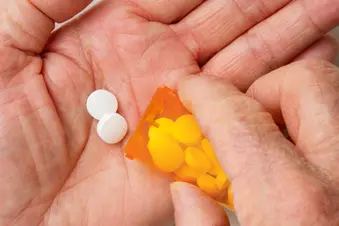
Medication can be expensive – sometimes very expensive. One of the simplest and best ways to save money on prescriptions is to use generic drugs. Generic medicines work the same as brand-name drugs, but cost 30% to nearly 85% less, according to the FDA.
What Are Generic Drugs?
After the FDA approves a new medication, other drugmakers figure out how to copy it. When the original medication’s patent runs out, other companies can sell their generic versions.
Not every drug has a generic equivalent, but many have more than one. Generic drugs are also approved by the FDA, but the process is shorter than that for brand-new medications.
Why Are They Less Expensive?
Generic drugs cost less because they have lower research costs. Their makers don’t have to redo the studies the brand-name medicine went through to prove the drug is safe and effective. Generic companies also usually spend much less on marketing.
Since there's often more than one generic for a brand-name medicine, this competition lowers prices for you, too. The more generic options there are for a medicine, the lower its prices usually are.
How Do Generic Drugs Compare?
Generic medications work the same way as their name-brand equivalents. They have to meet the same quality standards for strength, stability, and purity.
To be approved by the FDA, generic drugs must:
- Have the same active ingredient as the brand-name version
- Be taken the same way (like pills you swallow or creams you apply to your skin)
- Have the same strength
- Be made under the same standards
Generic drugs are also required to be "bioequivalent" to the brand-name medication. That means the medicine gives your body nearly the same amount of the active ingredient over a similar period of time as the brand-name drug.
But generic medications may have a different formulation than the original drug, or from other generic versions. They could have different inactive ingredients like fillers, stabilizers, coatings, colorings, and flavorings. These ingredients are included in every drug to make them useable and safe. They're usually harmless, but in rare cases, they can cause serious allergic reactions. If that happens, you'll need to stick to a version that doesn't contain the ingredient you're allergic to.
Because of trademark laws, generic drugs don’t look exactly like their brand-name counterparts.
When Should I Choose Generic Drugs?
You’re probably already using these medications – 9 out of 10 prescriptions in the United States are filled using generic drugs. In most cases, the generic option is an equal swap that will save you money.
Many doctors write prescriptions for generic drugs as often as possible. When your doctor prescribes a brand-name medication, your pharmacy can give you a generic version unless your doctor specifies not to. Your health insurance plan might also require you to use generic drugs when they're available.
Talk to your doctor if your prescription specifies a brand-name drug. Your pharmacist can also help communicate with your doctor’s office.
Over-the-counter medicines are also available in generic versions. Often, it's the store brand you'll find next to the recognizable bottle. In this case, too, generic drugs are just as safe and effective as the brand name. One study found that pharmacists prefer generic over-the-counter medications to the brand-name versions. They are more likely to use generics themselves.
More Ways to Make Smart Drug Choices
Many new drugs hit the market every year, including new generic drugs. But don’t assume your doctor will know about every generic that becomes available, or whether your insurance covers it. Always tell them if you're having trouble paying for your prescriptions.
Your pharmacist should be able to tell you if there's a generic on the market for a particular medication you've been prescribed.
Also keep in mind that different drugstores and reputable online pharmacies can offer varying prices for drugs. It pays off to compare and shop around for the best savings.
If your medications are still too expensive, let your doctor know. They may be able to prescribe fewer drugs or tell you about programs that can help. Don’t skip doses or take less medicine to save money. That can hurt your health and increases your chance of being hospitalized.
Show Sources
(Photo Credit: iStock/Getty Images)
SOURCES:
Congressional Budget Office: “Prescription Drugs: Spending, Use, and Prices.”
FDA: “Generic Drugs: Questions and Answers,” “Saving Money on Prescription Drugs,” “Generic Drug Facts,” “Generic Drugs.”
Merck Manual: “Brand Name and Generic Drugs.”
Journal of Pharmaceutical Policy and Practice: “A Cross-sectional Survey of Pharmacists to Understand Their Personal Preference of Brand and Generic Over-the-counter Medications Used to Treat Common Health Conditions.”
Federal Trade Commission: “Generic Drugs and Low-Cost Prescriptions.”
CDC: “National Health Interview Survey: Strategies Used by Adults to Reduce Their Prescription Drug Costs: United States, 2013.”
Medical Care: “Hospitalizations and Deaths Among Adults with Cardiovascular Disease Who Underuse Medications Because of Cost: A Longitudinal Analysis.”
Cedars-Sinai: "Generic vs. Brand Name Drugs: What's the Difference?"